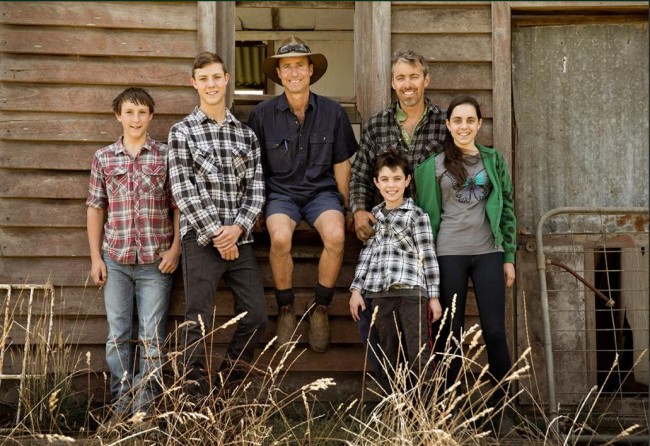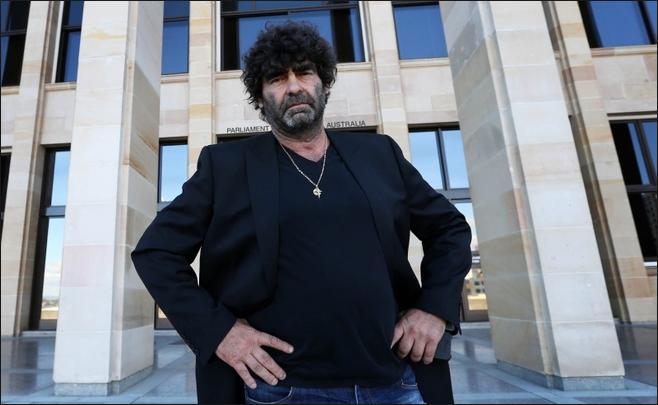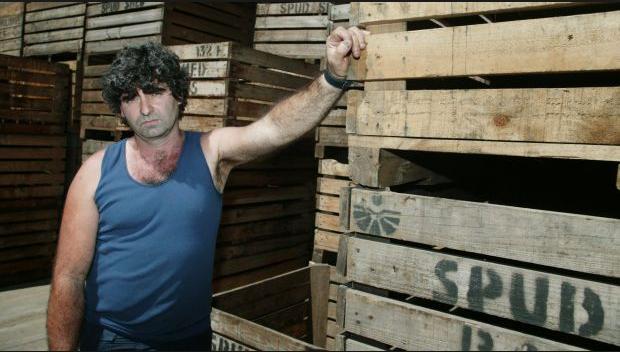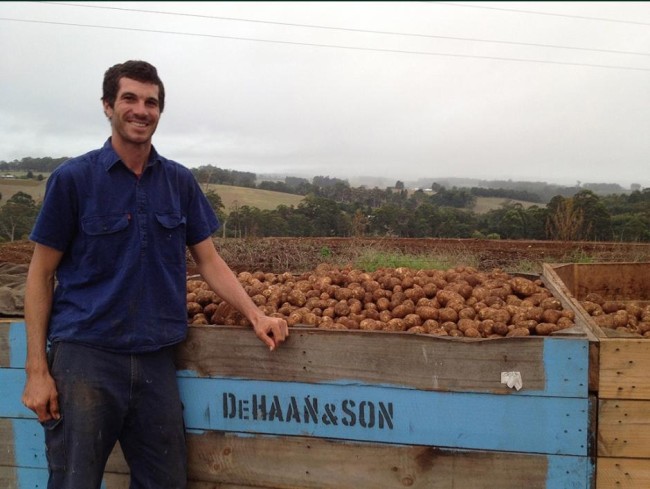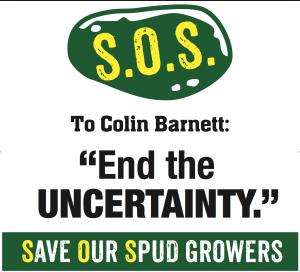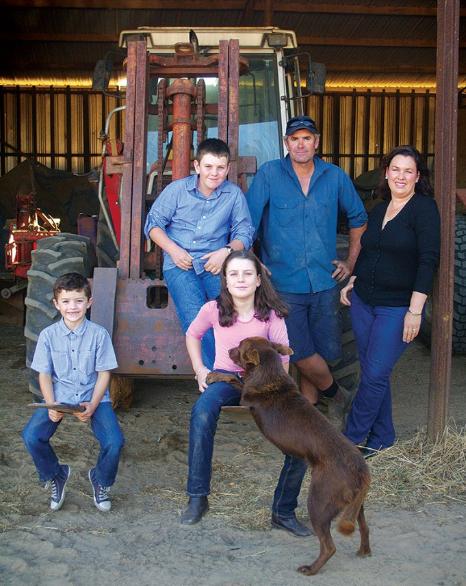Since the end of World War II when times were tough, Western Australia’s Potato Marketing Act of 1946 – and its subsequent regulator, the Potato Marketing Corporation of WA have ensured the food security of the potato staple to West Australians and at the same time a sustainable livelihood to protect local small-scale WA potato growing families.
It’s a success story. WA is the only state in Australia to grow fresh potatoes 365 days a year. This means WA is the only place you can buy locally grown, fresh potatoes all year round.
Thanks to the potato regulator, these days WA has a bustling potato industry with production standing at nearly 100,000 tonne annually. Some 78 potato growers in the south-west corner of the state, many 3rd generation Australians and older, produce most of the volume for the local WA fresh market. Excess supply is exported overseas.
If it ain’t broke don’t fix it.
Enter Da Spud Godfather
But one greedy immigrant wants to unravel a system that ain’t broke so he can undercut, go large scale, control the market so he can export and become super rich. Typical immigrants are in it for themselves, like multinationals, and have no loyalty Ordinary Australians.
Son of a Sicilian immigrant, Tony Galati and his brother Vince own Galati Brothers, one of the biggest potato growers in WA. Since a suspicious fire in 2009 gutted his $3m Baldivis warehouse, the Galati Group of companies has expanded into other fruit and vegetable lines, meat and eggs, with farms from Albany on the south coast up to Kununurra in the far north.
Tony also owns Spud Shed, a large Western Australian budget supermarket green grocer chain, which attracts 100,000 customers a week to six stores in the state, 24/7. No-one except Coles and Woolworths can complete with him on price. No-one likes dealing with Coles or Woolworths, but that is where he is heading – greedy snob land, where big business is big business and don’t expect friendly smiles.
To Tony, size, market share and growth is good. And he doesn’t want anyone getting in his way, least of all WA’s potato regulator.
To prevent oversupply and cheap dumping of potatoes on the WA market which would destroy decent margins of growers, the potato regulator advised mass producing Galati to grow 4,073 tonnes of potatoes between October 2014 and June 2015. But da Spud Godfather snubbed them and instead grew 8,681 tonnes. Then to undercut the market, in January 2016 he gave away 400 tonnes of that excess for free. Between October 2014 and January 2016, Galati harvest three times than fairly permitted.
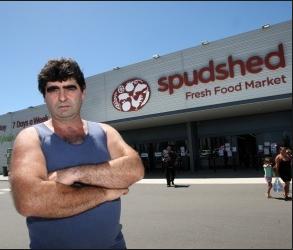 Tony, in Australia ‘hard work’ and ‘success’ is different to ‘greed’
Tony, in Australia ‘hard work’ and ‘success’ is different to ‘greed’
…if you want to assimilate (fit in)
Galati is greedy. He wants to further dominate WA’s potato growing and retail market, go even larger scale and in doing so drive small family-owned potato growers into the ground. He’s set up with Sindy Goodhew, and accountant and property developer, with now the Galati Group, connected to a host of property development deals around Rockingham and Joondalup cashing in on Perth’s insatiable housing sprawl.
The key strategy is ‘control’. Think Sicily, think Mafia, think Italian olive oil where in Italy it ain’t as extra virgin as the label claims, because the industry is controlled by da Mafia.
Galati has been in and out of the WA Supreme Court in Perth fighting the potato regulator for increased quotas for the past five years. he has also been actively lobbying the WA government and politicians. This month he won, with the WA government announcing its intention to repeal the law and deregulate from July 1, with growers to get a token $14 million ‘adjustment package’. That equates to an average of $180,000 for each of the 78 potato farming families to go away and retire quietly and sell up, denying future generations a living on the land.
Whereas in WA, Australian family-operated potato farms for generations have built up a self-sustaining fair marketing system to guarantee consumers the safe, sustainable supply of quality fresh potatoes whilst protecting the livelihoods of small growers. The system runs at no cost to the tax payer or subsidy from the government. WA consumers enjoy the lowest, or equal lowest, potato prices in Australia, with a choice of 35 different varieties. Freshly grown WA potatoes can make it from paddock to store in less than 24 hours.
The Potato Growers Association of Western Australia, the industry peak body, unanimously endorses the existence of the current marketing system for fresh potatoes in WA and does not seek deregulation of our industry. Vice-President Vaughan Carter said local growers would lose their jobs if the potato market was deregulated.
“If it does get deregulated, there are small families that would have to give up the game,” he said. “The big players take over.”
Yet both Labor and Liberal parties jointly in both Perth and Canberra have considered abolishing the potato regulator. WA Labor Leader Mark McGowan announced his party would actively campaign to have the system abolished. This month WA Liberal’s Agriculture and Food Minister Dean Nalder hasconfirmed WA’s potato industry will be deregulated from July 1, 2016.
LibLab neo-liberalist free market and free trade ideologies reckon cheap potatoes would benefit consumers. They reckon by removing the potato regulator and its annual potato quota restrictions could open up mass production for export. They call it ‘deregulation’. It is typical of neo-liberalist types in WA. If you’ve got money, you can dominate and destroy hardworking Aussie family businesses.
 WA Potato Growers future at stake
WA Potato Growers future at stake
But compare the deregulation of the dairy industry in WA which destroyed the livelihoods of small-scale dairy farmers. It caused vast fresh milk shortages which necessitated the import of product from the East Coast 3000 km away – hardly fresh!
Compare the deregulation of Australia’s garlic industry. Just ten years ago, Australia had 1,600 garlic growers. Yet with the initial dumping of cheap imports, local growers couldn’t compete. They disappeared, taking with them hundreds of garlic varieties.
It’s called ‘predatory pricing’ or ‘dumping’. Labor and Liberal call it “deregulation” and “free market enterprise” – bigger fish eat smaller fish. They spruik it as “opening up consumer choice and competition”.
Sounds like people really believe it is alright for one wealthy person to put all the others out of business. Just like Coles and Woolworths put thousands of people out of business, and now they can put whatever price they want on stuff. The big supermarket chains are not cheap anymore because they have a monopoly. Monopolistic capitalism and predatory practices are killing our economy, but some people think neoliberalism will bring them the goodies?
Today, Australians eat 3,500 tonnes of garlic annually. We produce just a fraction of this, about 500 tonnes. So the vast majority is imported; mostly it comes from China, but also from Africa, Taiwan, New Zealand and the United States. Imported garlic may be grown with chemicals banned in Australia. According to the Australian Garlic Industry Association, imported garlic is cool-stored; treated with growth inhibitors to stop it from sprouting on the shelf; bleached with chlorine for whiteness; and fumigated with methyl bromide (by law) to kill bugs and plant matter.
Garlic sold in Coles and Woolworths tastes crap because the garlic is Third World, old, GM modified and cheap.
Chairman of WA’s Potato Marketing Corporation, Ron Edwards, warns that farm gate prices will drop and the industry will contract as many small farms won’t be able to sustain their decent prices against mass dumping by the likes of greedy Galati.
WA Potato Growers Association executive officer Jim Turley says the regulator not only sets quality, but promotes tastier potato varieties and prevents oversupply and dumping, which could undercut the price farming producers get.
”We’re trying to look after our growers, we’re trying to look after our country towns and we’re trying to look after WA’s safe, fresh food products,” he said. He said it was a ”food security issue” and that if the laws and corporation were abolished, WA would have to rely on Belgian imports.
”They can supply chips into WA for less than $1 a kilo,” Mr Turley said.
WA potato grower, Daniel Omodei said the deregulation will put more power in the hands of bigger operators and he expects a lot of small farmers to leave the industry as a result. “There’s no question about that, I believe maybe up to 50 or 60 per cent of growers will leave the industry within the next 12 to 24 months,” he said.
Potato Growers Association of Western Australia Vice-President Vaughan Carter says WA’s 78 potato growers will be “reduced to a dozen”.
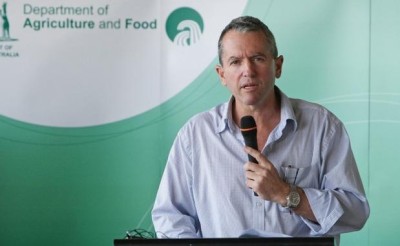 So what are the Nationals doing about it? Being good Liberal Party lapdogs and staying quiet and well-behaved. They let the Pastoral Lands Board go without a murmur.
So what are the Nationals doing about it? Being good Liberal Party lapdogs and staying quiet and well-behaved. They let the Pastoral Lands Board go without a murmur.
